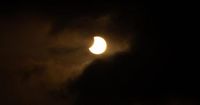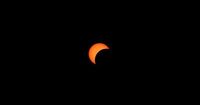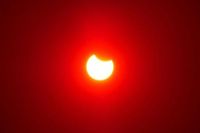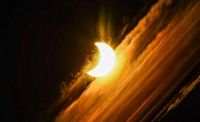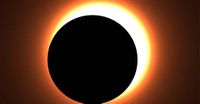The first solar eclipse of 2025 is set to dazzle astronomy enthusiasts this Saturday, March 29, occurring between 5:51 AM and 9:44 AM (Brasília time). This partial solar eclipse will be primarily visible across Europe, North America, northern South America, northern Asia, and parts of northern and western Africa, as well as regions in the Atlantic and Arctic. However, residents of Santa Catarina in Brazil will miss out, as the area falls outside the eclipse's visibility range.
According to the National Observatory, the extent of the solar obscuration will vary by location. For instance, in eastern Canada, observers can expect up to 92% of the Sun to be obscured by the Moon. In contrast, countries like Spain, France, and Germany will see only about 17% of the solar disk covered. This means that while the eclipse will be a breathtaking sight in some places, it will be a mere footnote in others.
Despite being a partial eclipse, safety precautions remain crucial. The observatory recommends using appropriate viewing equipment, such as special eclipse glasses or welder's glass rated at number 14, to prevent eye damage. Josina Nascimento, an astronomer at the National Observatory, emphasized the importance of these precautions, saying, "Even though it’s a partial eclipse, one should never look directly at the Sun without protection."
This solar eclipse is the second significant astronomical event of the year, following a total lunar eclipse that captivated viewers across Brazil on March 14, 2025, known as the "Blood Moon." During that event, the Moon took on a reddish hue as it passed through Earth's shadow, creating a stunning visual spectacle.
The upcoming solar eclipse also highlights the difference between total, partial, and annular eclipses. A solar eclipse occurs when the Moon passes between the Earth and the Sun, casting a shadow on the planet. In a total eclipse, the Moon completely covers the Sun, allowing only the solar corona to be seen. In a partial eclipse, like the one on March 29, only a portion of the Sun is obscured, leaving it partially visible. An annular eclipse occurs when the Moon is farther from the Earth, resulting in a ring-like appearance around the Sun.
While the eclipse will be most impactful in regions like eastern Canada, where the obscuration will be nearly complete, it will barely be noticeable in Brazil. In the extreme north of Amapá, observers may catch a fleeting glimpse of less than 1% of the Sun covered around 6:20 AM, but this will last for less than 20 minutes and will have minimal visual impact.
For those in Brazil wishing to experience this astronomical event, the best option will be to watch live broadcasts from international institutions. The Royal Observatory of Greenwich in the UK will stream the eclipse on its YouTube channel starting at 7 AM (Brasília time).
This solar eclipse, occurring in the sign of Aries, also carries astrological significance. It marks the end of the eclipse cycle on the Aries-Libra axis, which is associated with personal relationships and individual desires. Astrologers suggest that this eclipse could catalyze transformations in relationships, bringing clarity to issues of love and partnership. The energy generated by this eclipse may linger for up to six months, prompting individuals to reflect on their personal goals and relationships.
Astrologer Vanessa Tuleski noted, "The eclipse brings an opportunity for significant changes, especially concerning our desires and the way we interact with others." She emphasized the need for introspection during this time, as eclipses often act as catalysts for change, revealing what has been hidden and forcing decisions that may have been postponed.
As the eclipse approaches, it is essential to consider how it might impact various areas of life, as indicated by astrological charts. Each individual may experience the effects differently, depending on their personal astrological map. For instance, those with significant placements in Aries might feel a stronger push towards new beginnings and assertiveness, while others may find themselves reevaluating their relationships and personal values.
The solar eclipse's timing coincides with the presence of retrograde planets, which can add layers of complexity to the energies at play. The retrograde motion of Venus and Mercury may prompt individuals to reconsider their communication styles and financial decisions. Tuleski cautions against making hasty decisions during this time, advising people to balance their impulses with thoughtful reflection.
In conclusion, while the solar eclipse on March 29 will be a sight to behold for many around the world, its visibility will be limited in Brazil. However, the event carries with it a deeper significance, urging individuals to reflect on their personal desires and relationships as they navigate the changes brought forth by this celestial phenomenon. Whether through direct observation or via live streams, the eclipse offers a moment to pause and consider the cosmic forces at play in our lives.
